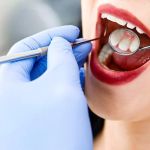How Diet Affects Oral Health and Disease Prevention
- 1. How Diet Impacts Oral Health
- 2. Essential Nutrients for Oral Health
- 3. Foods to Avoid for Healthy Teeth
- 4. Preventing Oral Diseases Through Diet
- 5. Real-Life Examples and Case Studies
- 6. How to Make Dietary Changes for Better Oral Health
1. How Diet Impacts Oral Health
Our diet plays a crucial role in maintaining oral health. The food we consume affects the balance of bacteria in our mouth, which in turn influences our dental hygiene. A diet high in sugar, for example, provides a food source for harmful bacteria, which can lead to tooth decay and gum disease. On the other hand, a balanced diet rich in vitamins and minerals can help prevent these conditions and promote overall oral well-being.
2. Essential Nutrients for Oral Health
Several nutrients are particularly beneficial for oral health. Calcium and vitamin D are vital for maintaining strong teeth and bones, while vitamin C supports gum health and helps prevent gum disease. Foods rich in antioxidants, such as berries, help combat inflammation and protect against the bacteria that cause plaque buildup. Incorporating these nutrients into your diet can go a long way in preventing dental issues.
3. Foods to Avoid for Healthy Teeth
While certain foods promote oral health, others can have a detrimental effect. Sugary snacks, carbonated drinks, and acidic foods can contribute to enamel erosion and cavities. Sticky foods, like caramel and candy, can linger on teeth and create an ideal environment for plaque to form. It’s important to minimize the consumption of these foods to maintain a healthy smile.
4. Preventing Oral Diseases Through Diet
Oral diseases such as cavities, gum disease, and bad breath can be prevented through a nutritious diet. Regular consumption of foods rich in fiber, like apples and celery, helps stimulate saliva production, which naturally cleanses the mouth. Also, drinking plenty of water helps wash away food particles and bacteria, reducing the risk of infections. A well-rounded diet supports the immune system, helping the body fight off oral diseases more effectively.
5. Real-Life Examples and Case Studies
Consider the case of Sarah, a 32-year-old woman who had struggled with frequent cavities and gum sensitivity. After adjusting her diet to include more calcium-rich foods like yogurt and leafy greens, as well as cutting back on sugary snacks, Sarah noticed a significant improvement in her oral health. Her dentist reported fewer cavities and improved gum condition, highlighting the direct link between diet and dental health.
6. How to Make Dietary Changes for Better Oral Health
Making dietary changes to improve oral health doesn’t have to be overwhelming. Start by gradually incorporating more fruits and vegetables into your meals, along with foods high in calcium and vitamin D. Drink water throughout the day to stay hydrated and help clean your mouth. Limiting sugary and acidic foods can significantly reduce your risk of dental issues. Consistency is key – the more these changes become habits, the better the results will be for your oral health.







 Rhode Island Children's Dentistry & Orthodontics4.0 (806 review)
Rhode Island Children's Dentistry & Orthodontics4.0 (806 review) Maple Brook Dental of MN4.0 (532 review)
Maple Brook Dental of MN4.0 (532 review) Dr. Valarie Kreps0.0 (0 review)
Dr. Valarie Kreps0.0 (0 review) Oral Surgery Hawaii4.0 (385 review)
Oral Surgery Hawaii4.0 (385 review) Gilbert Vista Dental4.0 (55 review)
Gilbert Vista Dental4.0 (55 review) Gentle Dental Riverside Tyler Village4.0 (122 review)
Gentle Dental Riverside Tyler Village4.0 (122 review) The Importance of Oral Health Education During Pregnancy for a Healthy Pregnancy
The Importance of Oral Health Education During Pregnancy for a Healthy Pregnancy Best Tips for Brushing Your Teeth Properly for Healthy Gums: Essential Techniques for Oral Health
Best Tips for Brushing Your Teeth Properly for Healthy Gums: Essential Techniques for Oral Health Why Skipping Dental Checkups Can Lead to Bigger Oral Health Problems
Why Skipping Dental Checkups Can Lead to Bigger Oral Health Problems Advantages of Porcelain Dental Restorations
Advantages of Porcelain Dental Restorations How Can Diabetes Cause Tooth and Gum Problems? Preventing and Managing Oral Health Issues
How Can Diabetes Cause Tooth and Gum Problems? Preventing and Managing Oral Health Issues Healthy Habits for Promoting Good Oral Health and Hygiene: Tips for a Healthy Smile
Healthy Habits for Promoting Good Oral Health and Hygiene: Tips for a Healthy Smile